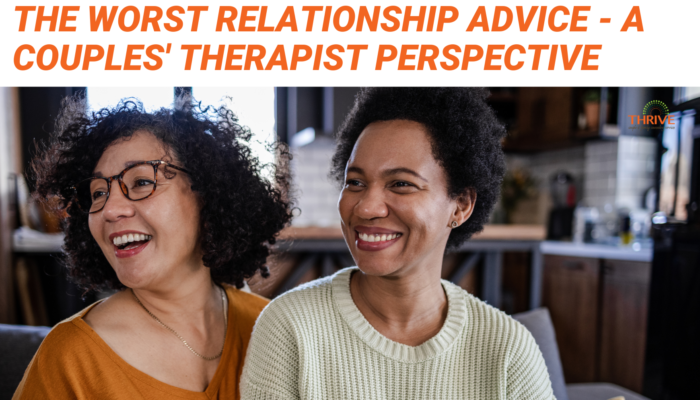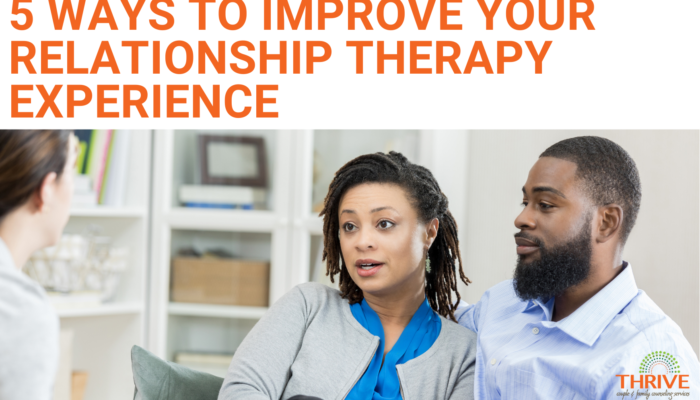Not all relationship advice is created equal.
In fact, as couples’ therapists, we frequently hear about popular relationship advice that is quite frustrating for us to see perpetuating because of the potential for damage to relationships and people!
As couples therapy experts who rely on Emotionally Focused Couple therapy for relationship work, we’ve seen how following bad relationship advice can lead to people blaming themselves or their partners, making the divide between you and your partner feel even bigger.
The mainstream understanding of how relationship conflicts work is often oversimplified, and can lead to disconnection, confusion, and further distress. If some of this advice resonates with you, that doesn’t mean that you’re in an unhealthy relationship or that there’s something wrong with you!
However, we’d like to offer another perspective, gathered from relationship and adult attachment research, as well as our own collective decades of experience as couple’s therapists.
Let’s unpack some of the worst relationship advice that we frequently hear from couples and individuals in our office, and offer perspectives that might be more helpful instead.
The relationship advice: You have to love yourself before anyone else can love you
Why this isn’t good advice (and what you can do instead)
This idea is so common – our therapists hear this in and out of sessions all of the time. The problem, though, is that the concept of perfect self love doesn’t really exist.
Most of us struggle in some ways with self-compassion. We often are dealing with an inner critic, or anxiety about being loveable or enough.
Anyone who has experienced childhood trauma is at a higher risk of concluding in some way, perhaps even subconsciously, that the trauma was their fault. Just as we know kids aren’t to blame for the trauma they’ve endured, no person at any age needs to change themselves in order to be worthy of love.
You don’t have to reach an unattainable goal of self-love before you’re allowed to have love in your life.
In fact, healthy relationships can themselves be the most powerful source for healing that humans can experience. In the context of secure attachment, many people can and do find healing for wounds around self-love and self-compassion.
Strong relationships are ones where people can lean on one another when feeling vulnerable and support each other through the difficult moments of self-doubt. Therapy helps couples build the kinds of strong bonds where this healing is not only possible, but actually the source of our most powerful healing – a loving relationship.
In Emotionally Focused Couple Therapy, we see the incredibly powerful beauty of people healing their deepest wounds and struggles with each other. It’s such an honor for us to get to see this kind of growth, and we have the privilege of seeing it regularly because of the healing power of EFT.
The relationship advice: You need to work on your issues/your partner needs to work on theirs individually before you can fix your relationship challenges
Why this isn’t good advice (and what you can do instead)
This is incorrect! Individual therapy has its time and place and can be very beneficial. However, most relational issues are actually harder to address in any lasting way without a trained couple therapist, helping you catch the negative patterns in real time and creating new ways of interacting.
When you’re both working on relationship problems in individual therapy, it’s harder for the therapist to see the way you relate to one another and help you develop new ways of communicating. Your individual therapist is working with you – and getting only your perspective. The perspective of your partner (and vice versa, with their therapist) isn’t considered, which makes changing negative patterns much trickier.
A couples therapy expert can help to identify relational issues as they happen live during couples therapy sessions. They can help point out the patterns where you get stuck and help couples to begin to communicate differently.
The relationship advice: This relationship has been difficult – that must mean we weren’t “meant to be together”
Why this isn’t good advice (and what you can do instead)
There are moments of difficulty in all relationships. All couples struggle and get caught in negative cycles. It’s not uncommon for fears to arise about the relationship when this begins to happen or to feel like your relationship is doomed.
However, all couples can learn to fight the negative cycle together, build connection, and grow in their secure attachment with one another. Building a healthy relationship is possible! We see it happen all the time in our couples counseling office.
Working with a therapist trained in Emotionally Focused Couples Therapy gives you the best chance to get to the bottom of your negative cycle in your relationship. 70-75% of couples who work with an EFT therapist go from distress to recovery, which is the most successful outcome compared to any couple therapy model that exists!
The relationship advice: If lost the spark in your relationship, you can’t get it back again
Why this isn’t good advice (and what you can do instead)
Like many things in life, sexual intimacy ebbs and flows over time. It’s very normal for relationships to go through cycles of feeling closer or more sexually intimate and then more distant again. Feeling like you’ve lost the “spark” in your relationship doesn’t mean you’re doomed to never reignite it.
All couples can learn to strengthen their closeness and sexual connection, and to communicate more effectively and know how to talk about it when they are feeling distant. Relationships are about playing the long game, and therapy can help you find ways to maintain connection and closeness so that you don’t start to feel so distant from each other again.
The relationship advice: You don’t need therapy, you can just talk to your friends
Why this isn’t good advice (and what you can do instead)
Your friends will inherently have a very biased perspective that misses the inner world of the partner, and understanding the impact of the negative cycle. Your friends love you, and it will be harder for them to see the full picture of what’s going on the way a therapist who is trained extensively in couples therapy would.
In addition, we all absorb incorrect and downright unhelpful or unhealthy messages about relationships (for example – see all of this popular relationship advice!) and sometimes, this is the feedback a friend might unknowingly give you.
We all develop coping strategies and attachment styles in response to relationship distress. While these tend to be repeated, anyone can learn to reach and respond differently to their partner. This is very hard to change when you are just talking to one person. To change your negative cycle and patterns of interaction effectively, it’s best to see a trained couple therapist, like EFT therapists.
The relationship advice: Don’t go to bed angry
Why this isn’t good advice (and what you can do instead)
This is one that we’ve probably all heard, but it can actually be really unhelpful. Sometimes, you might be ready to repair before bed, but that won’t always be the case. Rushing a conversation when one or both of you is still upset can backfire and make things worse.
Depending on you and your dynamic, it can better to give everyone time to calm down and figure out what they’d like to say, and talk about it when everyone is calm and able to listen. This is especially the case in relationships where one or both of you gets angry in a way that gets really big or loud. Don’t put pressure on yourself to figure it out based on an arbitrary timeline – do what works for you and your partner.
Sometimes, a partner will need reassurance that even though you are pausing the conversation, you are both committing to resuming the conversation when you are both feeling calmer, had time to process your feelings, or gotten some rest. Make sure you do come back together though, rather than sweeping things under the rug, or minimizing your feelings or your partner’s for the sake of “peace.”
The relationship advice: The kids always come first / make it work for the kids
Why this isn’t good advice (and what you can do instead)
While becoming a parent does, of course, mean shifting your priorities, you kids can’t be the only thing holding your relationship together. Kids are incredibly perceptive, and they often pick up on much more than we give them credit for. If there are problems at home, they know about it, and probably have their own feelings about it.
There are times when the kids need to come first, and there are times when it’s okay to focus on your relationship. Whatever is going on, you can teach them by example – either by doing what you can to work things out, maybe with the help of a couples counselor, or by ending the relationship.
The relationship advice: Therapy means your relationship isn’t healthy
Why this isn’t good advice (and what you can do instead)
This is one we hear a lot for individual counseling too – that if you go to therapy it means that something is wrong with you. This couldn’t be further from the truth!
Therapy, in all its forms, is like a tool in your emotional toolbox. Even if nothing is wrong, therapy can be a wonderful preventative tool to help you make a plan to get past obstacles before they even come up.
And if things aren’t great in your relationship and you’re seeking couples counseling, that still doesn’t necessarily mean that it’s unhealthy. In fact, it’s incredibly brave to recognize that you need help and to start down the path of rebuilding your connection. That shows that you value the relationship and care about your partner – two major building blocks for a healthy relationship.
The relationship advice: Constant fighting shows you’re passionate
Why this isn’t good advice (and what you can do instead)
Fighting is inevitable in relationships, but that doesn’t mean that you should constantly be in conflict with your partner. There’s an idea that fighting all of the time means that you’re passionate about each other, but that can be a simplistic way of looking at it. Of course, you probably are passionate about each other, but that doesn’t mean that’s what’s driving the conflict.
Usually, what’s behind relationship conflict is your negative cycle. Every relationship has one, and it’s the pattern of communication and behavior that you enact when you disagree. Getting to the bottom of the negative cycle, and learning how you both react, can help you manage conflict more effectively.
The relationship advice: Having kids will fix your relationship problems
Why this isn’t good advice (and what you can do instead)
While having kids is certainly a joyous occasion, bringing a child into the world to fix a relationship is just as likely to add more problems. Parenthood, for all of its delights, is extremely stressful, and adding stress, sleeplessness, and hormonal changes to an already fractured relationship can make things seem much more difficult.
Working with an Emotionally Focused Therapist can help you rebuild your secure connection with one another and find new ways of relating that can make you feel like you’re on the same team again.
The relationship advice: If they love you enough they will change
Why this isn’t good advice (and what you can do instead)
While change is possible, it’s not healthy to pin your relationships hopes on someone else changing. Whether your partner changes is out of your control, so the only thing you can do is decide what is and isn’t acceptable to you. Often, it’s not about how much love they have for you – change is hard, it’s painful, and it can bring up unpleasant feelings.
If there are things that you’d like to work on in your relationship, there is certainly hope, but expecting your partner to change entirely isn’t realistic. In successful relationships, both partners change in small ways to ensure their connection, but it should be collaborative and a compromise between both partners.
The relationship advice: Your partner should be your other half
Why this isn’t good advice (and what you can do instead)
While many of us feel close to our partners and like they fit well with us, expecting your partner to be your other half can put a lot of pressure on the relationship. We all need an extended support network. Friends, family, neighbors, coworkers- everyone needs more than one person. It can be stifling to feel like you need to be everything to your partner at all times.
Finding time to do things separately can help you have more to talk about when you are together, and help you feel like you’re forming your own identity outside of your relationship. If being apart creates significant anxiety, it might be good to get the support of a couples therapist to understand what is going on underneath.
The best relationship advice comes from people who know you well and whose opinion you trust – like a close friend, or a therapist. A therapist will never tell you what to do, but will offer advice and perspectives that can help you and your partner to build a more connected and fulfilling relationship. Learn more about couples counseling in our Centennial therapy office.




